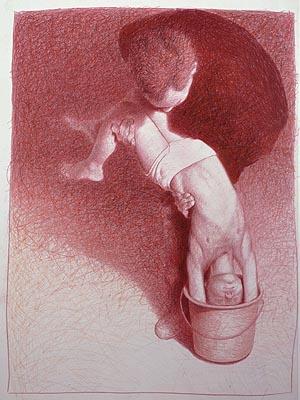 Our Father who is in heaven!
Our Father who is in heaven!
Why have you forgotten me?
You remembered the fruit in February,
when your flesh became ruby
My side is open as well,
and you do not want to look at me!
Nocturno, G. Mistral
Peter Newell, coordinator of the GLOBAL INITIATIVE TO END ALL Corporal PUNISHMENT OF CHILDREN is categorical in his 2010 report referring to corporal punishment inflicted upon Cuban children:
CUBA (second report – CRC/C/CUB/2)
Corporal punishment in the home
Corporal punishment in Cuban homes is legal.
The Family Code of 1975 allows “moderate” punishment by parents (article 86) and by those who are responsible for the care and/or education of children (article 152).
The legal regulations against violence and abuse in the Family Code (1975), Penal Code (1987) and the Constitution of the Republic, do not explicitly express prohibitions against corporal punishment in the upbringing of infants.
Corporal punishment outside the home
Corporal punishment in schools is legal.
The resolution, along with the Ministry of Education and the Ministry of Higher Education (1987) approved disciplinary regulations at work during educational activities. However, it is said that “every worker in educational activities can’t maltreat students by words or actions (article 4)” doesn’t specifically prohibit physical punishment.
In the penal system, physical punishment is criminal (article 30). This article also applies to prisons, but Mr. Newell explains that if evidence is lacking in other institutions pertaining to children it may conflict with the law. The Code of Children and Youth (1968) also does not prohibit the use of physical punishment in minor detainees.
Physical punishment is also legal in alternative child care centers …
On June 17th 2011, the Committee for Childrens’ Rights, later referred to as the Committee, in paragraph 36 section D. Civil Rights and Liberties (articles 7, 8, 13-17, 19 and 37 (a)) of the Convention (CRC), in the final report (CRC/C/CUB/2) explains its worries to the Cuban government given that:
Articles 86 and 152 of the Family Code are still enforced by the Cuban legislature. The committee highlights its dismay that corporal punishment is often used (in Cuba) as a disciplinary measure in schools as well as in social institutions.
In paragraph 37 the Committee recommended to the Cuban government that they pass legislation explicitly prohibited corporal punishment of children, both in State institutions and in the home.
The Committee defines “corporal” or “physical” punishment as any punishment that uses physical force with the objective of causing any pain or discomfort, however mild.
The Committee says that corporal punishment is always degrading. There are other forms of punishment that are not physical, but equally cruel and degrading, also incompatible with the Convention. There are punishments that humiliate, denigrate, scapegoat, threaten, terrify and ridicule the child.
Since September 2001, in the recommendations adopted following the general discussion on “Violence against children in the family and in schools,” the Committee on the Rights of the Child urged States to “urgently enact or repeal, as necessary, legislation so as to prohibit all forms of violence, however slight, in the family and in schools, including as a form of discipline, as provided in the Convention on Children’s Rights.”
Another result of the discussions held by the Committee in 2000 and 2001 was to request the Secretary-General of the United Nations, through the General Assembly, to conduct an in-depth international study on violence against children.
In 2001 the UN General Assembly enacted that recommendation. The United Nations study, conducted between 2003 and 2006, highlights “the need to ban all legalized violence against children, as well as a deep concern for the children themselves almost universal prevalence of corporal punishment in the family and for its persistent legality in many states, schools and other institutions, and correctional systems for children in conflict with the law.”
Fifteen years ago (1997), when Cuba presented an initial report before the Committee of Children’s Rights expressing its worries against the abuse committed against minors under the age of 18 and in this context recommended the development of a campaign to prevent corporal punishment. In 2011, the Committee calls on Cuba as a State to prioritize the elimination of all forms of violence against children, with particular attention in the case of girls. Among other recommendations proposed on the contentious issue, one stands out for its importance in Cuban society to help to discover how deep the scourge of violence against Cuban children is:
To consolidate a national data system, analysis and public dissemination that includes an agenda of investigation against child abuse.
MEMBER STATES. Countries that are members of the United Nations.
PARTY STATE(S). Countries that have ratified an agreement or a convention and therefore are obliged to abide by its provisions.
Translated by: Alexis Rhyner and others
